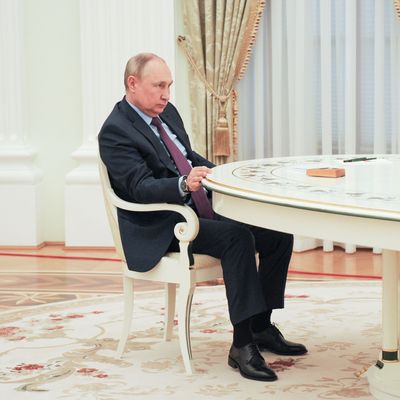
The United States directly sanctioned Vladimir Putin on Friday, blocking the Russian president from any economic activity involving the American financial system. The Biden administration had already issued several major sanctions against Russia but had stopped short of punishing Putin directly for ordering the invasion of Ukraine.
Biden’s decision to target Putin and Russia’s top diplomat, Sergey Lavrov, came after he coordinated with European allies who also froze the duo’s assets held in E.U. member nations. “They are responsible for the deaths of innocent people in Ukraine and for trampling on the international system,” said German foreign minister Annalena Baerbock. “We, as Europeans, do not accept that.” While Putin and Lavrov do not appear to have a great deal of holdings within the bloc, the move is symbolically significant: The only other leaders sanctioned by the E.U. are Syrian president Bashar al-Assad and Belarusian president Alexander Lukashenko.
But it wasn’t enough to comfort Ukrainian president Volodymyr Zelensky, who urged the E.U. to block all travel for Russians, issue an oil embargo, and ban Moscow from SWIFT, the international network connecting thousands of banks in Europe and North America. “This morning, we are defending our state alone,” Zelensky, who remained in Kyiv despite the target on his head, said Friday. “Like yesterday, the world’s most powerful forces are watching from afar. Did yesterday’s sanctions convince Russia? We hear in our sky and see on our earth this was not enough.”
This post has been updated.
The Latest on ukraine
- House Passes Ukraine, Israel Aid: How It Happened
- Trump’s Plan for Every Foreign-Policy Problem Is Himself
- Putin Is Winning — and He’s Flaunting It






























